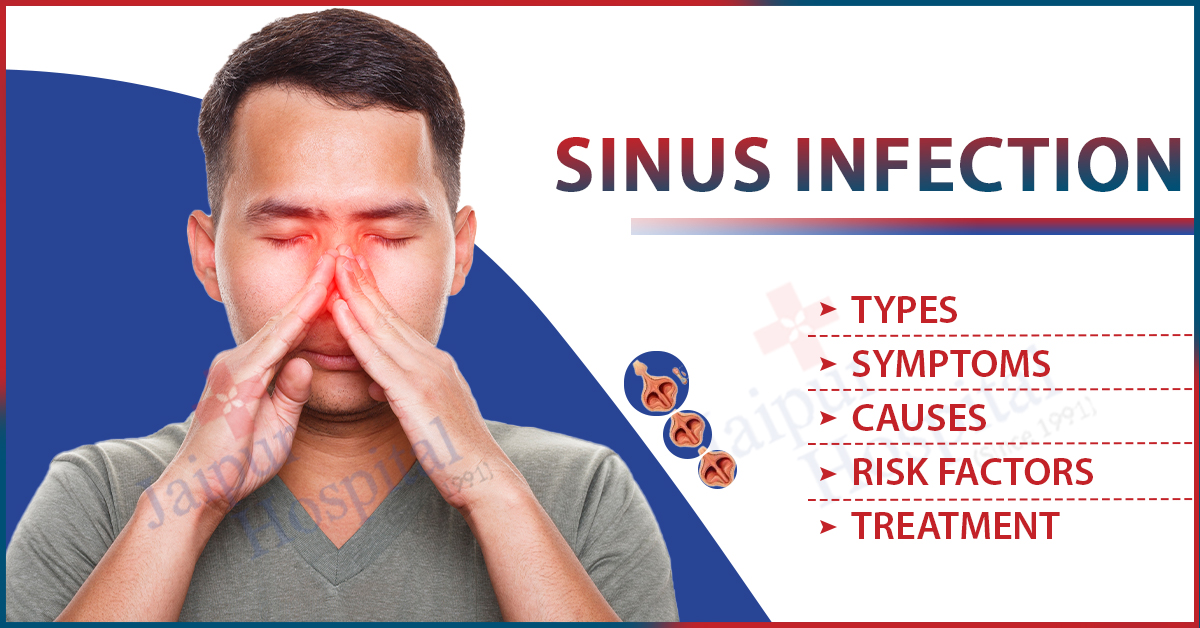A sinus infection, or sinusitis, is a common condition that affects the sinuses—the air-filled spaces in the skull located around the nose and eyes. This condition can be caused by a variety of factors and can significantly impact quality of life. In this discussion, we will explore the different types of sinus infections, including acute, subacute, chronic, and recurrent.
We’ll delve into the common symptoms, such as nasal congestion, facial pain, and headache, and examine the primary causes, including infections, allergies, and structural issues. Whether you’re seeking to understand more about sinus infections for personal knowledge or to better manage your health, this overview will provide a comprehensive look at this prevalent condition.
What is Sinusitis (sinus infection)?
Sinusitis, also known as a sinus infection, is defined scientifically as the inflammation of the mucous membrane lining the sinuses. This condition typically results from an infection, which can be viral, bacterial, or fungal, or from other factors such as allergies or structural abnormalities in the nasal passages. The inflammation leads to swelling and increased mucus production, which can cause blockage of the sinus cavities and disrupt normal drainage, potentially leading to symptoms such as nasal congestion, facial pain, and headache. Sinusitis can be classified based on duration and frequency into acute, subacute, chronic, and recurrent forms.
Types of sinus infections
Sinus infections, or sinusitis, can be classified into several types based on their duration and frequency. Here are the main types with their scientific definitions:
- Acute Sinusitis:
- Acute sinusitis is characterized by sudden onset and typically lasts less than four weeks. It often follows a viral upper respiratory infection, such as a common cold, and can be accompanied by symptoms like nasal congestion, facial pain, and purulent nasal discharge. Acute sinusitis can be caused by bacteria or viruses and is usually self-limiting.
- Subacute Sinusitis:
- Subacute sinusitis is a type of sinus infection that persists for 4 to 12 weeks. It represents a transitional phase between acute and chronic sinusitis. Symptoms are similar to those of acute sinusitis but last longer. Subacute sinusitis can result from incomplete resolution of an acute infection or ongoing inflammation.
- Chronic Sinusitis:
- Chronic sinusitis is defined by persistent inflammation of the sinuses lasting for 12 weeks or longer, despite treatment. This type is often associated with ongoing or recurrent infections, allergies, or other underlying conditions that impair normal sinus drainage and mucosal function. Chronic sinusitis is characterized by prolonged symptoms such as nasal congestion, facial pressure, and decreased sense of smell.
- Recurrent Sinusitis:
- Recurrent sinusitis refers to multiple episodes of acute sinusitis occurring throughout the year, with each episode lasting less than four weeks. It is defined by the recurrence of symptoms at least three times a year. This type often indicates an underlying issue, such as chronic allergic rhinitis or anatomical abnormalities, that predispose individuals to frequent infections.
Symptoms of Sinusitis
The symptoms of sinusitis can vary depending on the type and severity of the infection. Common symptoms include:
- Nasal Congestion: Blockage or stuffiness in the nasal passages, making it difficult to breathe through the nose.
- Facial Pain or Pressure: Discomfort or pain around the eyes, cheeks, forehead, or between the eyes, often exacerbated by bending forward or lying down.
- Headache: Pain or pressure in the forehead or behind the eyes that can be persistent and may worsen with sinus congestion.
- Thick Nasal Discharge: Mucus that is yellow or green, which may be thick and can drain down the back of the throat (postnasal drip).
- Reduced Sense of Smell or Taste: A decrease in the ability to smell or taste food, often due to congestion and inflammation.
- Cough: A persistent cough, often worse at night, due to postnasal drip irritating the throat.
- Fever: Elevated body temperature, which may be present, especially in acute sinusitis.
- Fatigue: Feeling fatigued due to the body’s effort to fight the infection and the impact of chronic symptoms.
- Bad Breath: Foul-smelling breath (halitosis) caused by infection or mucus buildup.
- Tooth Pain: Discomfort in the upper teeth or jaw, as the roots of the upper teeth are close to the sinuses.
What Causes Sinus Infections?
Sinus infections, or sinusitis, can be caused by various factors, often involving an interplay between infection and inflammation. Here are the primary causes:
- Viral Infections:
- The most common cause of acute sinusitis is a viral infection, such as a common cold. Viruses can lead to inflammation and swelling of the sinus lining, obstructing normal mucus drainage.
- Bacterial Infections:
- Bacterial infections can develop as a secondary complication following a viral infection. When the sinus passages are blocked, bacteria can grow and cause acute bacterial sinusitis. Common bacteria include Streptococcus pneumoniae, Haemophilus influenzae, and Moraxella catarrhalis.
- Fungal Infections:
- Fungal sinusitis is less common and typically occurs in individuals with weakened immune systems or specific risk factors. Fungi can invade the sinus tissues, causing chronic or acute symptoms. Common fungi include Aspergillus and Candida species.
- Allergies:
- Allergic reactions, such as those to pollen, dust mites, or mold, can cause inflammation and swelling of the sinus lining. This can lead to blockage and mucus buildup, increasing the risk of sinus infections.
- Structural Abnormalities:
- Anatomical issues, such as a deviated nasal septum, nasal polyps, or sinus cysts, can obstruct sinus drainage pathways, contributing to chronic sinusitis by preventing normal mucus flow.
- Environmental Irritants:
- Exposure to irritants like tobacco smoke, air pollution, or strong odors can inflame the sinus linings and impair their function, making them more susceptible to infection.
- Immune System Disorders:
- Conditions that affect the immune system, such as cystic fibrosis or primary immune deficiency disorders, can increase the risk of recurrent or chronic sinus infections by impairing the body’s ability to fight off infections and manage mucus production.
What are the risk factors of sinusitis?
Several risk factors can increase the likelihood of developing sinusitis. These include:
- Allergies:
- Allergic conditions, such as allergic rhinitis, can cause inflammation and swelling of the nasal passages and sinuses, increasing the risk of sinus infections.
- Frequent Respiratory Infections:
- Repeated viral upper respiratory infections, like the common cold, can lead to sinusitis by causing inflammation and congestion that blocks sinus drainage.
- Structural Abnormalities:
- Anatomical issues such as a deviated nasal septum, nasal polyps, or sinus cysts can obstruct sinus drainage pathways, making it easier for infections to develop.
- Smoking and Exposure to Tobacco Smoke:
- Smoking and exposure to secondhand smoke irritate and inflame the nasal and sinus linings, increasing susceptibility to sinusitis.
- Air Pollution:
- Pollutants and irritants in the air can inflame the sinuses and make them more prone to infection.
- Immune System Disorders:
- Conditions that weaken the immune system, such as cystic fibrosis, HIV/AIDS, or primary immune deficiencies, can increase the risk of chronic or recurrent sinus infections.
- Chronic Health Conditions:
- Chronic conditions like diabetes, which can affect immune function, may also make individuals more susceptible to sinus infections.
- Gastroesophageal Reflux Disease (GERD):
- GERD can lead to postnasal drip, which can irritate the sinuses and contribute to sinusitis.
Diagnosis of Sinus Infection
Diagnosing a sinus infection, or sinusitis, involves several steps to assess symptoms, identify the underlying cause, and determine the most appropriate treatment. Here’s an overview of the diagnostic process:
- Medical History and Symptom Review
- Evaluate symptoms, duration, severity, and potential triggers (e.g., allergies).
- Physical Examination
- Examine nasal passages for swelling, discharge, and tenderness.
- Imaging Studies
- CT Scan: Detailed images to assess structural abnormalities and inflammation.
- MRI: Detailed view for complex cases, including fungal infections or tumors.
- Nasal Endoscopy
- Insert a flexible tube with a camera to directly view sinuses and obtain tissue samples if needed.
- Laboratory Tests
- Nasal Cultures: Identify bacterial infections and guide antibiotic treatment.
- Allergy Testing: Identify specific allergens if allergies are suspected.
- Blood Tests
- Assess overall health and rule out other conditions.
- Diagnosis Criteria
- Acute Sinusitis: Symptoms lasting less than 4 weeks.
- Chronic Sinusitis: Symptoms lasting 12 weeks or longer.
- Recurrent Sinusitis: Multiple episodes of acute sinusitis throughout the year.
Also Read:- Bulky Uterus: Symptoms, Causes, Diagnosis & Treatment
Treatment of sinusitis
Treatment for sinusitis varies depending on the type, severity, and underlying cause of the condition. Here’s a comprehensive overview of the treatment options:
- Home Remedies and Self-Care
- Nasal Irrigation: Using a saline solution to rinse the nasal passages can help relieve congestion and remove mucus.
- Steam Inhalation: Inhaling steam from a bowl of hot water or a humidifier can help moisten the nasal passages and ease congestion.
- Warm Compresses: Applying a warm compress to the face can help alleviate facial pain and pressure.
- Hydration: Drinking plenty of fluids helps thin mucus and promotes drainage.
- Rest: Adequate rest supports the body’s immune response and aids recovery.
- Medications
- Decongestants: Oral or nasal decongestants can reduce nasal congestion and swelling. However, nasal decongestant sprays should not be used for more than a few days to avoid rebound congestion.
- Pain Relievers: Over-the-counter pain relievers, such as acetaminophen or ibuprofen, can help alleviate facial pain and headaches.
- Antihistamines: For sinusitis caused by allergies, antihistamines can help reduce allergic reactions and relieve symptoms.
- Nasal Corticosteroids: Prescription nasal sprays containing corticosteroids can reduce inflammation and are particularly useful for chronic sinusitis or allergic rhinitis.
- Antibiotics
- When Necessary: Antibiotics are prescribed for bacterial sinusitis if symptoms persist beyond 10-14 days or if there is a severe infection. They are not typically used for viral sinusitis.
- Fungal Treatments
- Antifungal Medications: For fungal sinusitis, especially in immunocompromised individuals, antifungal medications may be required.
- Surgical Interventions
- Endoscopic Surgery: In cases of chronic sinusitis or when structural abnormalities obstruct sinus drainage, endoscopic surgery may be performed to remove polyps, correct structural issues, or improve sinus drainage.
- Management of Underlying Conditions
- Addressing Allergies: Managing allergies with medications or avoiding allergens can help prevent sinusitis.
- Treating GERD: For sinusitis linked to gastroesophageal reflux disease, treating GERD can help reduce symptoms.
Conclusion
In conclusion, sinus infections, or sinusitis, encompass a range of conditions characterized by inflammation of the sinus cavities, leading to various symptoms from nasal congestion to facial pain. Effective management involves understanding the type of sinusitis, identifying the underlying causes, and utilizing appropriate treatment options, which can range from home remedies to surgical interventions. Accurate diagnosis is crucial for targeted treatment and relief. Sinusitis falls under the realm of Otolaryngology (ENT – Ear, Nose, and Throat). For those seeking specialized care in this field, Jaipur Hospital is renowned for its expertise in diagnosing and treating sinus infections, offering comprehensive care to address both acute and chronic conditions.


